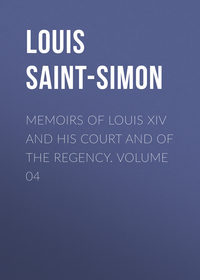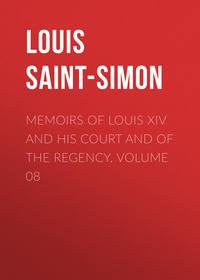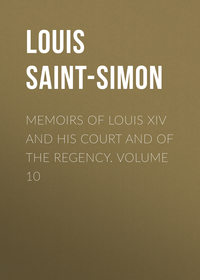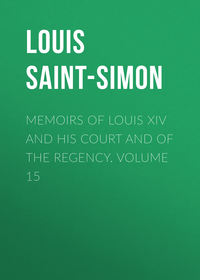 полная версия
полная версияMemoirs of Louis XIV and His Court and of the Regency. Complete
He promised everything, so glad was he to be let off thus cheaply, and in truth he kept to his word, both as to the secret and the work. He had never seen a Bed of justice, and had not the slightest notion what it was like. I sat down on his bureau, and drew out the design of one. I dictated to him the explanations in the margin, because I did not wish them to be in my handwriting. I talked more than an hour with him; I disarranged his furniture, the better to show to him the order of the assembly, and explained to him what was to be done, so that all might be carried to the Tuileries and erected in a very, few moments. When I found I had made everything sufficiently clear, and he had understood me, I returned to the Palais Royal as though recollecting something, being already in the streets, to deceive my people.
A servant awaited me at the top of the staircase, and the concierge of the Palais Royal at the door of M. le Duc d’Orleans’ room, with orders to beg me to write. It was the sacred hour of the roues and the supper, at which all idea of business was banished. I wrote, therefore, to the Regent in his winter cabinet what I had just done, not without some little indignation that he could not give up his pleasure for an affair of this importance. I was obliged to beg the concierge not to give my note to M. le Duc d’Orleans unless he were in a state to read it and to burn it afterwards.
Our preparations for the Bed of justice continued to be actively but silently made during the next few days. In the course of the numberless discussions which arose upon the subject, it was agreed, after much opposition on my part, to strike a blow, not only at the Parliament, but at M. du Maine, who had fomented its discontent. M. le Duc, who had been admitted to our councils, and who was heart and soul against the bastards, proposed that at the Bed of justice the education of the young King should be taken out of the control of M. du Maine and placed in his hands. He proposed also that the title of Prince of the Blood should be taken from him, with all the privileges it conferred, and that he should be reduced to the rank of a simple Duke and Peer, taking his place among the rest according to the date of his erection; thus, at a bound, going down to the bottom of the peerage!
Should these memoirs ever see the light, every one who reads them will be able to judge how such a proposition as this harmonised with my personal wishes. I had seen the bastards grow in rank and importance with an indignation and disgust I could scarcely contain. I had seen favour after favour heaped upon them by the late King, until he crowned all by elevating them to the rank of Princes of the Blood in defiance of all law, of all precedent, of all decency, if I must say the word. What I felt at this accumulation of honours I have more than once expressed; what I did to oppose such monstrous innovations has also been said. No man could be more against M. du Maine than I, and yet I opposed this proposition of M. le Duc because I thought one blow was enough at a time, and that it might be dangerous to attempt the two at once. M. du Maine had supporters, nay; he was at the head of a sort of party; strip him of the important post he held, and what might not his rake, his disappointment, and his wounded ambition lead him to attempt? Civil war, perhaps, would be the result of his disgrace.
Again and again I urged these views, not only upon M. le Duc d’Orleans, but upon M. le Duc. Nay, with this latter I had two long stolen interviews in the Tuileries Gardens, where we spoke without constraint, and exhausted all our arguments. But M. le Duc was not to be shaken, and as I could do no more than I had done to move him, I was obliged at last to give in. It was resolved, however, that disgrace should fall upon M. du Maine alone; that his brother, the Comte de Toulouse, an account of the devotion to the State he had ever exhibited, and his excellent conduct since the death of the late King, should, when stripped of his title like the other, receive it back again the moment after, in acknowledgment of the services he had rendered to the Regent as Councillor of State, and as an expression of personal good feeling towards him, which his excellent qualities so justly merited.
I returned home from my last interview with M. le Duc, and went to mass at the Jacobins, to which I entered from my garden. It was not without a distracted mind. But I prayed to God sincerely and earnestly to guide my steps, so that I might labour for His glory and the good of the State without private ends. My prayer was heard, and in the sequel I had nothing to reproach myself with. I followed the straight road without turning to the right or to the left.
Fontanieu was waiting for me in my house as I returned home from mass, and I was obliged to listen to his questions and to reply to them, as though I had nothing on my mind. I arranged my chamber like a Bed of Justice, I made him understand several things; connected with the ceremonial that he had not under stood before, and that it was essential he should in no way omit. Thus everything went on satisfactorily, and I began to count the hours, by day as well as by night, until the great day was to arrive on which the arrogant pride of the Parliament was to receive a check, and the false plumage which adorned the bastards was to be plucked from them.
In the midst of the sweet joy that I felt, no bitterness entered. I was satisfied with the part I had played in this affair, satisfied that I had acted sincerely, honestly, that I had not allowed my own private motives to sway me; that in the interests of the State, as opposed to my own interests, I had done all in my power to save the Duc du Maine. And yet I did not dare to give myself up to the rosy thoughts suggested by the great event, now so rapidly approaching. I toyed with them instead of allowing myself to embrace them. I shrunk from them as it were like a cold lover who fears the too ardent caresses of his mistress. I could not believe that the supreme happiness I had so long pined for was at last so near. Might not M. le Duc d’Orleans falter at the last moment? Might not all our preparations, so carefully conducted, so cleverly planned, weigh upon his feebleness until they fell to the ground? It was not improbable. He was often firm in promises. How often was he firm in carrying them out? All these questions, all these restless doubts— natural as it appears to me under the circumstances—winged their way through my mind, and kept me excited and feverish as though life and death were hanging on one thread.
In the midst of my reflections, a messenger from M. le Duc d’Orleans, Millain by name, arrived at my house. It was on the afternoon of Thursday, the 25th of August, 1718. His message was simple. M. le Duc d’Orleans was in the same mood as ever, and I was to join him at the Palais Royal, according to previous agreement, at eight o’clock in the evening. The Bed of justice was to be held on the morrow.
Never was kiss given to a beautiful mistress sweeter than that which I imprinted upon the fat old face of this charming messenger! A close embrace, eagerly repeated, was my first reply, followed afterwards by an overflow of feeling for M. le Duc, and for Millain even, who had worthily served in this great undertaking.
The rest of the day I passed at home with the Abbe Dubois, Fagon, and the Duc de la Force, one after the other finishing up our work. We provided against everything: If the Parliament refused to come to the Tuileries, its interdiction was determined on: if any of the members attempted to leave Paris they were to be arrested; troops were to be assembled in order to carry out the Regent’s orders; we left no accident without its remedy.
The Abbe Dubois arranged a little code of signals, such as crossing the legs, shaking a handkerchief, or other simple gestures, to be given the first thing in the morning to the officers of the body-guards chosen to be in attendance in the room where the Bed of Justice was to be held. They were to fix their eyes upon the Regent, and when he made any of the above signals, immediately to act upon it according to their written instructions. The Abbe Dubois also drew out a sort of programme for M. le Duc d’Orleans, of the different orders he was to give during the night, fixing the hour for each, so that they might not arrive a minute too soon or a minute too late, and secrecy thus be maintained to the very latest moment.
Towards eight o’clock in the evening I went to they Palais Royal. I was horror-struck to find M. le Duc d’Orleans in bed with fever, as he said; I felt his pulse. Fever, he had, sure enough; perhaps from excitement caused by the business in hand. I said to him it was only fatigue of body and mind, of which he would be quit in twenty-four hours; he, on his side, protested that whatever it might be, he would hold the Bed of justice on the morrow. M. le Duc, who had just entered, was at his pillow; the chamber lighted by a single wax candle. We sat down, M. le Duc and I, and passed in review the orders given and to give, not without much apprehension on account of this fever, come so strangely out of season to the healthiest man in the world, and who had never had it before.
I exhorted the Regent to take as much repose as he could, so that he might be fully able to execute the great work of the morrow, the safety of the Regency itself being at stake. After this I felt his pulse again, not without fear. I assured him, however, his illness would be nothing; without, it is true, being too sure of it myself. I took my leave about ten o’clock, and went out of the room with Millain. When I found myself alone with him in the cabinet, through which we passed, I embraced him with an extreme pleasure. We had entered by the backstairs; we descended by the same, so as not to be observed. It was dark, so that on both occasions we were obliged to grope our way. Upon arriving at the bottom I could not refrain from again embracing Millain, so great was my pleasure, and we separated each to his home.
The arrangements respecting the troops and for summoning the Parliament, etc., were all carried out to the letter during the night and early morning. At the hours agreed upon M. le Duc d’Orleans gave the various orders. About four o’clock in the morning the Duc du Maine, as colonel- general of the Swiss guards, was aroused. He had not been in bed above an hour, having just returned from a fete given at the arsenal by Madame du Maine. He was doubtless much astonished, but contained himself, hid his fear, and sent at once to instruct his companies of Swiss guards of the orders they were to execute. I don’t think he slept very well after this, uncertain as he must have been what was going to happen. But I never knew what he or Madame du Maine did after being thus rudely disturbed.
Towards five o’clock in the morning drums began to be heard throughout the town, and soon soldiers were seen in movement. At six o’clock a message was sent to the Parliament requesting it to attend at the Tuileries. The reply was that the request should be obeyed. The members thereupon debated whether they should go to the Tuileries in coaches or on foot. The last mode was adopted as being the most ordinary, and in the hope of stirring the people and arriving at the Tuileries with a yelling crowd. What happened will be related in its place.
At the same time, horsemen went to all the Peers and officers of the Crown, and to all the chevaliers of the order, the governors and lieutenant-governors of the provinces (who were to accompany the King), informing them of the Bed of Justice. The Comte de Toulouse had been to supper at the house of M. de Nevers, near Saint-Denis, and did not return until late into the night. The French and Swiss guards were under arms in various quarters; the watch, the light horse, and the two companies of musketeers all ready in their barracks; the usual guard at the Tuileries.
If I had slept but little during the last eight days, I slept still less that night, so near to the most considerable events. I rose before six o’clock, and shortly after received my summons to the Bed of justice, on the back of which was a note that I was not to be awakened, a piece of politeness due to the knowledge of the bearer, who was aware that this summons would teach me nothing I did not know. All the others had been awakened, surprised thereby to an extent that may be imagined.
Towards eight o’clock in the morning a messenger from M. le Duc d’Orleans came to remind me of the Regency Council at eight o’clock, and to attend it in my mantle. I dressed myself in black, because I had only that suit with a mantle, and another, a magnificent one in cloth of gold, which I did not wish to wear lest it should cause the remark to be made, though much out of season, that I wished to insult the Parliament and M. du Maine. I took two gentlemen with me in my coach, and I went in order to witness all that was to take place. I was at the same time full of fear, hope, joy, reflection, and mistrust of M. le Duc d’Orleans’ weakness, and all that might result from it. I was also firmly resolved to do my best, whatever might happen, but without appearing to know anything, and without eagerness, and I resolved to show presence of mind, attention, circumspection, modesty, and much moderation.
Upon leaving my house I went to Valincourt, who lived behind the hotel of the Comte de Toulouse. He was a very honourable man, of much intellect, moving among the best company, secretary-general of the navy, devoted to the Comte de Toulouse ever since his early youth, and possessing all his confidence. I did not wish to leave the Comte de Toulouse in any personal fear, or expose him to be led away by his brother. I sent therefore for Valincourt, whom I knew intimately, to come and speak to me. He came half-dressed, terrified at the rumours flying over the town, and eagerly asked me what they all meant. I drew him close to me and said, “Listen attentively to me, and lose not a word. Go immediately to M. le Comte de Toulouse, tell him he may trust in my word, tell him to be discreet, and that things are about to happen to others which may displease him, but that not a hair of his head shall be touched. I hope he will not have a moment’s uneasiness. Go! and lose not an instant.”
Valincourt held me in a tight embrace. “Ah, Monsieur,” said he, “we foresaw that at last there would be a storm. It is well merited, but not by M. le Comte, who will be eternally obliged to you.” And, he went immediately with my message to the Comte de Toulouse, who never forgot that I saved him from the fall of his brother.
CHAPTER XCII
Arrived at the grand court of the Tuileries about eight o’clock without having remarked anything extraordinary on the way. The coaches of the Duc de Noailles, of Marechal de Villars, of Marechal d’Huxelles, and of some others were already there. I ascended without finding many people about, and directed the two doors of the Salle des Gardes, which were closed, to be opened. The Bed of justice was prepared in the grand ante- chamber, where the King was accustomed to eat. I stopped a short time to see if everything was in proper order, and felicitated Fontanieu in a low voice. He said to me in the same manner that he had arrived at the Tuileries with his workmen and materials at six o’clock in the morning; that everything was so well constructed and put up that the King had not heard a sound; that his chief valet de chambre, having left the room for some commission about seven o’clock in the morning, had been much astonished upon seeing this apparatus; that the Marechal de Villeroy had only heard of it through him, and that the seats had been erected with such little noise that nobody had heard anything. After having well examined everything with my eyes I advanced to the throne, then being finished; wishing to enter the second ante-chamber, some servants came to me, saying that I could not go in, all being locked up. I asked where I was to await the assembling of the Council, and was admitted to a room upstairs, where I found a good number of people already congregated.
After chatting some time with the Keeper of the Seals, the arrival of M. le Duc d’Orleans was announced. We finished what we had to say, and went downstairs separately, not wishing to be seen together.
The Council was held in a room which ever since the very hot weather the King had slept in. The hangings of his bed, and of the Marechal de Villeroy’s were drawn back. The Council table was placed at the foot of one of the beds. Upon entering the adjoining chamber I found many people whom the first rumours of such an unexpected occurrence had no doubt led there, and among the rest some of the Council. M. le Duc d’Orleans was in the midst of a crowd at the end of the room, and, as I afterwards learned, had just seen the Duc du Maine without speaking to him, or being spoken to.
After a passing glance upon this crowd I entered the Council chamber. I found scattered there the majority of those who composed the Council with serious and troubled looks, which increased my seriousness. Scarcely anybody spoke; and each, standing or seated here and there, kept himself in his place. The better to examine all, I joined nobody. A moment after M. le Duc d’Orleans entered with a gay, easy, untroubled air, and looked smilingly upon the company. I considered this of good augury. Immediately afterwards I asked him his news. He replied aloud that he was tolerably well; then approaching my ear, added that, except when aroused to give his orders, he had slept very well, and that he was determined to hold firm. This infinitely pleased me, for it seemed to me by his manner that he was in earnest, and I briefly exhorted him to remain so.
Came, afterwards, M. le Duc, who pretty soon approached me, and asked if I augured well from the Regent, and if he would remain firm. M. le Duc had an air of exceeding gaiety, which was perceptible to those behind the scenes. The Duc de Noailles devoured everything with his eyes, which sparkled with anger because he had not been initiated into the secret of this great day.
In due time M. du Maine appeared in his mantle, entering by the King’s little door. Never before had he made so many or such profound reverences as he did now—though he was not usually very stingy of them— then standing alone, resting upon his stick near the Council table, he looked around at everybody. Then and there, being in front of him, with the table between us, I made him the most smiling bow I had ever given him, and did it with extreme volupty. He repaid me in the same coin, and continued to fix his eyes upon everybody in turn; his face agitated, and nearly always speaking to himself.
A few minutes after M. le Duc came to me, begging me to exhort M. le Duc d’Orleans to firmness: then the Keeper of the Seals came forth for the same purpose. M. le Duc d’Orleans himself approached me to say something a moment afterwards, and he had no sooner quitted my side than M. le Duc, impatient and troubled, came to know in what frame of mind was the Regent. I told him good in a monosyllable, and sent him away.
I know not if these movements, upon which all eyes were fixed, began to frighten the Duc du Maine, but no sooner had M. le Duc joined the Regent, after quitting me, than the Duc du Maine went to speak to the Marechal de Villeroy and to D’Effiat, both seated at the end of the room towards the King’s little door, their backs to the wall. They did not rise for the Duc du Maine, who remained standing opposite, and quite near them, all three holding long discourses, like people who deliberate with embarrassment and surprise, as it appeared to me by the faces of the two I saw, and which I tried not to lose sight of.
During this time M. le Duc d’Orleans and M. le Duc spoke to each other near the window and the ordinary entrance door; the Keeper of the Seals, who was near, joined them. At this moment M. le Duc turned round a little, which gave me the opportunity to make signs to him of the other conference, which he immediately saw. I was alone, near the Council table, very attentive to everything, and the others scattered about began to become more so. A little while after the Duc du Maine placed himself where he had been previously: the two he quitted remained as before. M. du Maine was thus again in front of me, the table between us: I observed that he had a bewildered look, and that he spoke to himself more than ever.
The Comte de Toulouse arrived as the Regent had just quitted the two persons with whom he had been talking. The Comte de Toulouse was in his mantle, and saluted the company with a grave and meditative manner, neither accosting nor accosted: M. le Duc d’Orleans found himself in front of him and turned towards me, although at some distance, as though to testify his trouble. I bent my head a little while looking fixedly at him, as though to say, “Well, what then?”
A short time afterwards the Comte de Toulouse had a conversation with his brother, both speaking with agitation and without appearing to agree very well. Then the Count approached M. le Duc d’Orleans, who was talking again to M. le Duc, and they spoke at some length to each other. As their faces were towards the wall, nothing but their backs could be seen, no emotion and scarcely a gesture was visible.
The Duc du Maine had remained where he had spoken to his brother. He seemed half dead, looked askance upon the company with wandering eyes, and the troubled agitated manner of a criminal, or a man condemned to death. Shortly afterwards he became pale as a corpse, and appeared to me to have been taken ill.
He crawled to the end of the table, during which the Comte de Toulouse came and said a word to the Regent, and began to walk out of the room.
All these movements took place in a trice. The Regent, who was near the King’s armchair, said aloud, “Now, gentlemen, let us take our places.” Each approached to do so, and as I looked behind mine I saw the two brothers at the door as though about to leave the room. I leaped, so to speak, between the King’s armchair and M. le Duc d’Orleans, and whispered in the Regent’s ear so as not to be heard by the Prince de Conti:
“Monsieur, look at them. They are going.”
“I know it,” he replied tranquilly.
“Yes,” I exclaimed with animation, “but do you know what they will do when they are outside.”
“Nothing at all,” said he: “the Comte de Toulouse has asked me for permission to go out with his brother; he has assured me that they will be discreet.”
“And if they are not?” I asked.
“They will be. But if they are not, they will be well looked after.”
“But if they commit some absurdity, or leave Paris?”
“They will be arrested. Orders have been given, and I will answer for their execution.”
Therefore, more tranquil, I sat down in my place. Scarcely had I got there than the Regent called me back, and said that since they had left the room, he should like to tell the Council what was going to be done with respect to them. I replied that the only objection to this, their presence, being now removed—I thought it would be wrong not to do so. He asked M. le Duc in a whisper, across the table, afterwards called to the Keeper of the Seals; both agreed, and then we really seated ourselves.
These movements had augmented the trouble and curiosity of every one. The eyes of all, occupied with the Regent, had been removed from the door, so that the absence of the bastards was by no means generally remarked. As soon as it was perceived, everybody looked inquiringly around, and remained standing in expectation. I sat down in the seat of the Comte de Toulouse. The Duc de Guiche, who sat on the other side of me, left a seat between us, and still waited for the bastards. He told me to approach nearer to him, saying I had mistaken my place. I replied not a word, looking on at the company, which was a sight to see. At the second or third summons, I replied that he, on the contrary, must approach me.
“And M. le Comte de Toulouse?” replied he.
“Approach,” said I, and seeing him motionless with astonishment, looking towards the Duc du Maine’s seat, which had been taken by the Keeper of the Seals, I pulled him by his coat (I was seated), saying to him, “Come here and sit down.”
I pulled him so hard that he seated himself near me without understanding aught.
“But what is the meaning of all this?” he demanded; “where are these gentlemen?”
“I don’t know,” replied I, impatiently; “but they are not here.”









